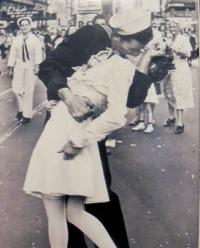Victory in Europe Day — known as V-E Day or VE Day — commemorates 8 May 1945 (in Commonwealth countries; 7 May 1945), the date when the World War II Allies formally accepted the unconditional surrender of the armed forces of Nazi Germany and the end of Adolf Hitler's Third Reich. The formal surrender of the occupying German forces in the Channel Islands was not until 9 May 1945. On 30 April Hitler committed suicide during the Battle of Berlin, and so the surrender of Germany was authorized by his replacement, President of Germany Karl Dönitz. The administration headed by Dönitz was known as the Flensburg government. The act of military surrender was signed on 7 May in Reims, France, and ratified on 8 May in Berlin, Germany.
Upon the defeat of Nazi Germany, celebrations erupted throughout the western world. From Moscow to New York, people cheered. In the United Kingdom, more than one million people celebrated in the streets to mark the end of the European part of the war. In London, crowds massed in Trafalgar Square and up The Mall to Buckingham Palace, where King George VI and Queen Elizabeth, accompanied by Prime Minister Winston Churchill, appeared on the balcony of the Palace before the cheering crowds. Princess Elizabeth (the future Queen Elizabeth II) and her sister Princess Margaret were allowed to wander anonymously among the crowds and take part in the celebrations.
In the United States, President Harry Truman, who turned 61 that day, dedicated the victory to the memory of his predecessor, Franklin D. Roosevelt, who had died of a cerebral hemorrhage less than a month earlier, on 12 April. Flags remained at half-mast for the remainder of the 30-day mourning period. Truman said of dedicating the victory to Roosevelt's memory and keeping the flags at half-staff that his only wish was "that Franklin D. Roosevelt had lived to witness this day." Massive celebrations also took place in Chicago, Los Angeles, Miami, and especially in New York City's Times Square.



